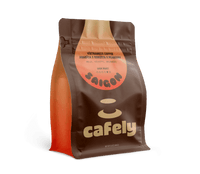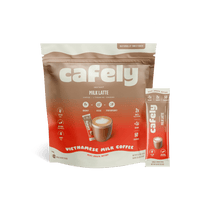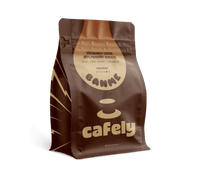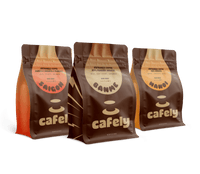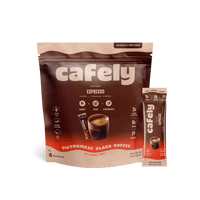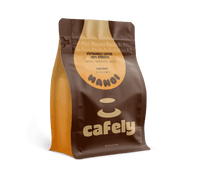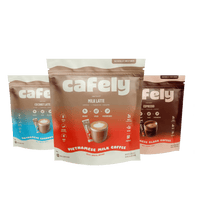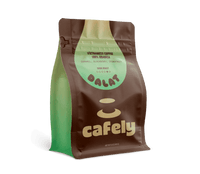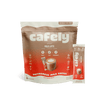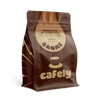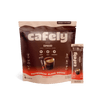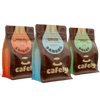Coffee’s natural bitterness comes from compounds like caffeine, chlorogenic acids, and tannins — but the right bean, roast, and brew method can make all the difference.
Even the best coffee can taste harsh without the right approach.
From dialing in your grind size to adding simple ingredients to your cup, here’s how to smooth out the bitterness and brew a better-tasting coffee.
What Makes Coffee Bitter?
Several compounds in coffee contribute to its bitterness. Although these compounds are naturally occurring, higher concentrations than normal can result in a more bitter coffee than usual through over-roasting or poor production techniques.
Here are some of the compounds that make coffee bitter:
1. Chlorogenic Acids

Chlorogenic acids are a group of antioxidants found in high concentrations in raw, green coffee beans. When roasted, these compounds break down into quinic acids, caffeic acids, and phenylindanes, adding bitter notes to coffee.
The longer coffee beans are roasted, the more chlorogenic acids break down — this is why dark and French roasts tend to be more bitter than light and medium roasts.
2. Trigonelline
Trigonelline is a nitrogen-based alkaloid responsible for coffee’s nutty, toasted flavors and aromas. During roasting, trigonelline breaks down into several components such as pyrroles, pyridine, and nicotinic acid (vitamin B3).
The Maillard reaction that occurs during roasting converts trigonelline into these compounds. The longer the beans are roasted, the more trigonelline is converted.
This leads to a higher concentration of bitter compounds — particularly nicotinic acid. Extremely dark roasts, such as French roasts, get a large percentage of their bitterness from this compound.
3. Melanoidins
Melanoidins are another compound formed during the Maillard reaction. It's this chemical that gives grilled or charcoal-grilled foods their toasted flavors.
While melanoidins are responsible for much of coffee's intense “toasted” flavors, they can also produce bitter notes in higher concentrations.
Dark roasts usually have higher concentrations of this chemical.
4. Caffeine
Caffeine is a natural stimulant that gives coffee its energy-boosting effects.
This compound is inherently bitter, which makes it a good pest deterrent. It's believed some plants (like those in the Coffea genus) produce caffeine for this reason.
Coffee with higher caffeine levels may taste more bitter than coffee with lower caffeine levels. This could be why robusta coffee — which has twice the caffeine as arabica variety — is naturally more bitter.
However, it's a minor contributor to overall bitterness compared to the other compounds mentioned above.
5. Catechols & Tannins
Polyphenols — a group of compounds including catechols and tannins — contribute to the bitterness and astringency of some brewed coffee.
In a perfectly brewed cup of coffee, these compounds shouldn't cause bitter notes.
However, when coffee is over-extracted, higher concentrations are dissolved into the water, leading to a bitter taste and a “drying” sensation on the tongue. This can be avoided by perfecting your brewing method and grinding your coffee to the correct consistency.
Arabica vs. Robusta: Which Is Less Bitter?
Arabica and robusta are two different coffee species with distinct flavors.
Arabica is smooth, naturally sweet, and lower in caffeine — making it the less bitter option.
Robusta, on the other hand, is bolder, more bitter, and packs more caffeine.
If you're aiming for a mellow, low-bitterness brew, go for 100% arabica like our DaLat roast. Prefer a strong, bold cup?
Robusta can work too — especially when paired with condensed milk or cream, as in traditional Vietnamese coffee.
For that style, try a balanced robusta blend like Saigon OG.
Six Tips That Will Make Your Coffee Less Bitter
There are several ways to reduce the bitterness of your coffee, from the way you brew the beans to the things you add to the coffee.
Here are six ways you can make your coffee less bitter:
1. Avoid Over Extraction
Over-extraction is the leading cause of bitter coffee. This happens when the grounds are too fine, are left to steep for too long, or the water is too hot.
To avoid over-extraction, make sure to use the correct grind size for the brewing method — fine for espresso brews, coarse for immersion brewers such as the French press, or medium-coarse for pour-over setups like the Chemex brewer.
Make sure your water is the perfect temperature for your brewing method, and monitor the brew time closely. You’ll also want to avoid leaving your coffee to brew for too long but also avoid under-brewing it — this can lead to under-extraction and a watery cup of coffee.
2. Choose the Right Coffee Beans
The type of coffee beans you choose can affect the bitterness of your brew. Robusta, arabica, and blends all produce brews with varying levels of bitterness. For example, 100% arabica beans like DaLat coffee and arabica-rich blends like DaNang are naturally sweeter and less bitter compared to 100% robusta and robusta-rich blends like Saigon OG.
The roast level of the beans can also affect how bitter the final brew is. Generally, lighter roasts are less bitter than darker roasts because the beans haven't been exposed to heat long enough to develop bitter compounds. However, light roasts are much more floral and acidic, which may not provide the textbook “coffee flavor” you're familiar with.
Medium roast offers the best balance of sweetness and bitterness. This roast level allows the natural sugars in the bean time to caramelize and develop without turning overly bitter.
If you want a bean that will create the least bitter cup, opt for a light roast arabica. If you want a less bitter cup of coffee with rich, dark flavor, go for a medium roast arabica.
3. Alter Your Brewing Method

The brewing method you use and the steps you take during the brewing process can affect the flavor profile of the resulting cup. Certain brewing methods, such as coffee percolation, are prone to over-extraction, which can result in a bitter brew. Other methods, like brewing coffee with French press, are time-sensitive — over-immersion (leaving the grounds to steep for too long) can result in a bitter brew.
If you want to produce the best-tasting cup of coffee that's not bitter, it's essential that you master your brewing method.
Here are some brewing methods to try that can produce a well-balanced cup of coffee without bitterness:
- Hario V60 (Pour-Over)
- Chemex coffee brewer (Pour-Over)
- Kalita Wave (Pour-Over)
- Drip Coffee Maker
- Espresso Machine
- Moka Pot
- Vacuum Pot
4. Add Sugar
Adding a teaspoon or two of sugar or a sugar-free sweetener is one of the easiest ways to counteract the bitterness of coffee. Sugar balances coffee's flavor by enhancing the brew's natural sweetness.
If you want to avoid sugar, opt for a natural alternative such as honey, maple syrup, or stevia. You can also opt for an arabica variety with a higher sugar content such as those produced in Ethiopia or Colombia.
5. Add a Pinch of Salt
Although adding salt to your coffee sounds counterintuitive and downright silly, it can actually help neutralize bitterness and enhance its natural sweetness. Salt suppresses bitter flavors and brings out the subtle sweetness in coffee — it's for these reasons it works so well in caramel and rich, chocolatey desserts.
You can add salt to your grounds before brewing or stir a pinch into your cup after. Make sure to use a small amount and adjust as you see fit because adding too much can have the opposite effect.
6. Add Milk or Cream

Milk, cream, or plant-based alternatives help reduce bitterness by softening the coffee’s acidity and adding a smooth texture. The fat in dairy binds with bitter compounds, mellowing the taste.
Whole milk or cream provides the richest, creamiest texture, which is best for mellowing out coffee's bitter notes. Almond milk adds a subtle sweetness and light creaminess — just enough to counteract the bitterness of vegan coffee.
Condensed milk can also be added to coffee to sweeten and cream the brew. This is perhaps the best way to mellow out the bitter notes of coffee. Adding sweetened condensed milk to coffee is common in Vietnam, where the local bean is dark roast robusta — an intense, naturally bitter coffee.
FAQs: How to Make Coffee Less Bitter
Do you want to learn more about reducing the bitterness of coffee?
Check out the answers to the frequently asked questions below, or head over to the Cafely Blog to learn more…
1. What Makes Coffee Bitter?
Coffee is naturally bitter due to a combination of chemical compounds and brewing factors. The caffeine, chlorogenic acids, and quinic acids in coffee make it naturally bitter. The roasting process also affects bitterness — the darker the roast, the more acid breaks down into bitter compounds. The brewing process, over-extraction, high water temperatures, and incorrect grind sizes can also make coffee overly bitter.
2. What’s the Least Bitter Type of Coffee?
The least bitter coffee bean is arabica coffee. This bean is naturally sweet and has a mild caffeine content. Brews made with arabica coffee are sweet, smooth, and mellow. It's the perfect bean for making a variety of brews from drip coffee and pour-over to espresso and moka pot coffee.
3. What’s the Best Brewing Method for Making Non-Bitter Coffee?
If you wish to produce the least bitter cup of coffee you should opt for a cold brew extraction method. Cold brew coffee is made by extracting coarsely ground coffee in cold water over 18 hours or more.
This slow extraction process results in a low-acidity brew that's naturally sweet and bold yet mellow. For hot coffee, pour-over brewing produces a less bitter brew. The delicate brewing process doesn't over-extract the coffee or allow the grounds to steep for long periods, resulting in a clean, fresh brew.
4. Does Adding Sugar to Coffee Make it Less Bitter?
Yes, adding a spoonful of sugar to coffee can make your brew less bitter. Sugar interacts with the taste buds, making it more difficult to perceive bitterness, allowing you to taste the complex flavors of coffee without the intense and sometimes harsh bitterness that comes with it.
5. Does Adding Milk to Coffee Make It Less Bitter?
Yes, adding a splash of milk or cream to your coffee can counteract its bitterness. The proteins in dairy milk bind to the bitter-tasting polyphenols, tannins, and quinic acids in coffee, reducing their impact on your taste buds. The fat in dairy milk and some plant-based alternatives also add a smooth, creamy mouthfeel that can counteract the bitter flavors of coffee.
6. How Long Should You Brew French Press Coffee for the Best Tasting Cup?
The ideal brewing time for making coffee with a French press is four minutes. Make sure you grind the coffee to a coarse grind (similar in texture to kosher salt) and use fresh, filtered water that's hot but not boiling.
7. What’s the Sweeter Coffee — Arabica or Robusta?
Arabica coffee is naturally sweeter than robusta. Arabica beans produce sweet, smooth brews with a mild caffeine content. Robusta beans produce a dark, bold, bitter brew with a high caffeine content. If you want to make sweet coffee that's less bitter than most, opt for a 100% arabica coffee such as DaLat or a balanced blend such as Saigon OG.
8. Why Is Instant Coffee So Bitter?
Instant coffee is often more bitter than freshly brewed coffee due to several factors related to production and quality. Instant coffee is generally made with poor-quality robusta beans, which are naturally bitter. The product is also made using invasive processes that can over-extract the bitter compounds in the coffee, leading to a poor-quality, bitter final product.
9. Is Vietnamese Coffee Bitter?
Vietnamese coffee can be bitter because it's made using robusta coffee beans. This type of coffee produces a much more intense, dark, bold cup of coffee that tastes more bitter than arabica. However, this intense brew is often served with sweetened condensed milk, which reduces the bitterness of the coffee.
10. Why Is Condensed Milk Added to Vietnamese Coffee?
Condensed milk is traditionally added to Vietnamese coffee to add sweetness and a creamy consistency. This sweet dairy product enhances the texture and flavor of the brew and balances out the intense bitterness of robusta.
Condensed milk is a huge part of Vietnamese coffee culture, enjoyed both hot (cà phê sữa nóng) and iced (cà phê sữa đá).
